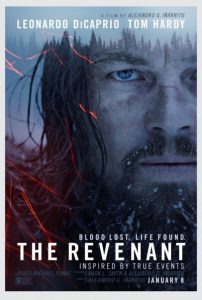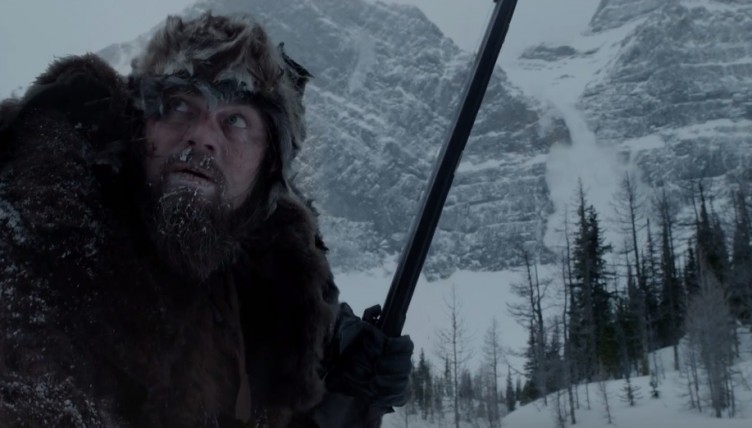 An early American trapper struggles to survive against the native population, the harsh wilderness and his own demons in The Revenant.
An early American trapper struggles to survive against the native population, the harsh wilderness and his own demons in The Revenant.
Have you ever had one of those horrible days where everything goes wrong? The alarm doesn’t go off because the power’s out. You have to take a cold shower and dress in the dark, and when you head out to the driveway, you find that your car’s been stolen. You get a ride into work only to discover that the CEO ran off with all of the company’s assets, leaving everyone out of a job. You head home early, devastated, only to find your partner in bed with someone else. For rugged hunter Hugh Glass (Leonardo DiCaprio), that day would qualify as a walk across a rose-filled field under the warming light of a healing summer sun.
Glass is the kind of pure naturalist who could thrive while suspended upside down from a tree, naked, in the dead of winter — all while carving a table and set of chairs from the nearby bark. Pneumonia wouldn’t have the nerve or strength to even contemplate settling in for a visit. Glass would be more suitably named Steel. He makes his way through life as a hunter employed by a local outpost and paid by the pelt. His boss, Captain Andrew Henry (Domhnall Gleeson), respects Glass more than anyone else on his detail. It’s a respect that’s quickly tested when, after a catastrophic encounter with the unwelcoming local natives and wildlife, Glass is left in dire straits. The troop needs to make its way back to the safety of its outpost and can’t afford any distractions — a point made succinctly and often by the group’s most vocal narcissist John Fitzgerald (Tom Hardy).
Director Alejandro González Iñárritu [Birdman or (The Unexpected Virtue of Ignorance)] is a master of the art of making dark films. Unfortunately, only one of those films (21 Grams — 2003’s argument for the necessity of Prozac) even remotely interested me. His latest venture stars a raw DiCaprio in a role seemingly penned with the purpose of earning him his first Oscar. He certainly doesn’t disappoint. Iñárritu surrounds his lead with captivating vistas, perfect cinematography and a haunting score that set the film on the rails of becoming an instant classic, if only the script would buy a ticket on the same train.
We’re continually reminded that Glass has a challenging past — one that makes him perpetually suspect to several of his peers. I can only assume that the origins of that enigmatic past were somehow mistakenly edited out of the final cut to avoid delivering a three-hour film. There’s also a pivotal scene involving the antagonist (Hardy in another reliably flawless performance) that is astoundingly unbelievable. The sheer quantity of calamities that befall the beleaguered backwoodsman stretches the limits of credibility as well; a Marvel superhero would find it hard to keep pace. It’s also not a film for the squeamish. To call the film graphic would be the understatement of the year. Leave the big meal for after the movie.
Spotty script aside, this is an epic journey of tenacity, willpower and determination beyond imagination. It’s the kind of film that leaves an indelible mark — a good one for me.




3 Comments
Good movie but Leo has very few lines. Great movie to fast forward through. He will win an Oscar because he is due, not because he deserves it for this film.
I really think that speaking isn’t a prerequisite to an Oscar. Daniel Day Lewis didn’t say a whole lot in My Left Foot and won. There were things I really, didn’t like about this film, but when I looked at the /chart I realized it definitely kept me interested the whole film.
Your review gave me e good sense of the movie and I can’t wait to see it on the small csreen